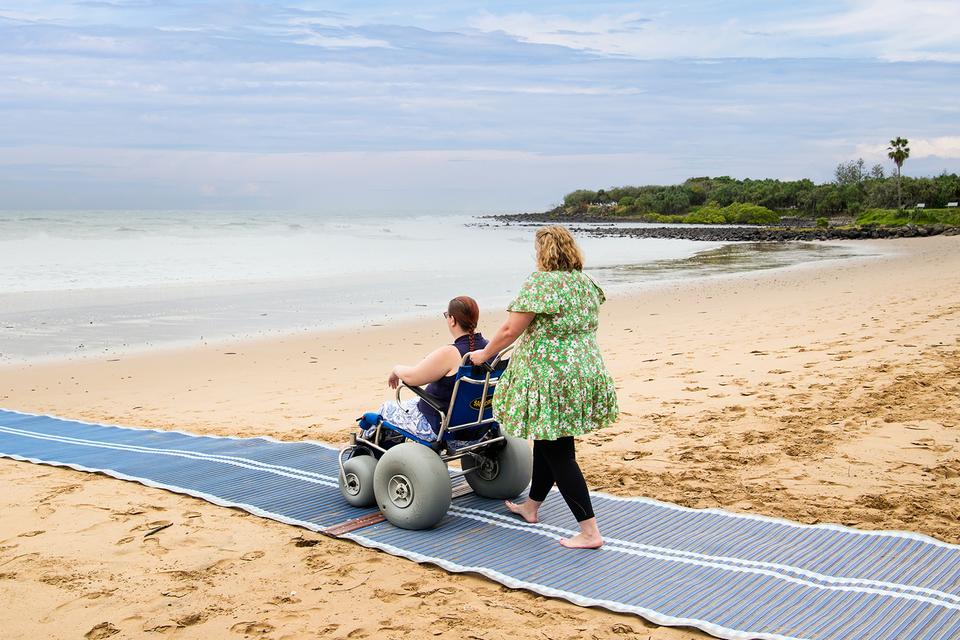Breaking Down Beach Barriers

Description
The Universal Beach Accessibility Hub (U‐BEACH): A pathway to increase physical activity participation, health, and wellbeing in individuals with mobility limitations, is an initiative to help break down the barriers of beach access for people living with disability or mobility limitations.
Partners
Accessible Beaches Australia, Australian Physiotherapy Association, Bendigo Bank (Community Bank Gin Gin), Bundaberg Regional Council, Bundaberg Surf Lifesaving Club, Cairns Regional Council, Community Lifestyle Support, Coral Coast Physiotherapy and Allied Health, Gladstone Regional Council, Heart of Agnes Community Association, IMPACT Community Services, Independent Living Specialists Bundaberg, Mable Community, Regional Health and Mobility, Rise-up Support Partners, Rotary Club of Bundaberg and Wide Bay Rehab.
Impact
U‐BEACH will be the first study to develop and evaluate the impact of a universal beach accessibility program on the health and wellbeing of Australians living with a disability. Consultation through this project has already helped create accessible beaches in Bundaberg, Cairns and Agnes Water, with improvements or modifications to accessibility made at Sunshine Coast and Gold Coast beach locations. The establishment of Bundaberg’s first accessible beach subsequently allowed for the launch of the first CQUniversity U-Beach Community Beach Day event in 2023. More than 250 individuals attended the inaugural event, many of whom have not had the physical, technical or social support to access the beach for many years.
Researcher
Sasha Job, Dr Steven Obst and Dr Luke Heales
Led by CQUniversity neurological physiotherapy and research higher degree candidate, Sasha Job, the project will contribute to her PhD research thesis under the supervision of Dr Steven Obst and Dr Luke Heales.
As a practicing physiotherapist, Ms Job initially identified the need to develop and evaluate a collaborative and community-driven model of accessibility for beach environments.
"With one in five Australians living with some form of disability, there are a significant number of people who experience terrain and facility challenges when accessing the beach environments,” says Ms Job.
"Not only do these individuals miss out on visiting Australia's most popular recreational destination, but they cannot experience the many physical, mental, and social health benefits of beach activities.”
In response, Ms Job brought together community members who identified as having a disability, government representatives, surf lifesaving, local disability organisations, health professionals, volunteer organisations and mobility suppliers from across the Bundaberg region, in Queensland, Australia.
The collaborative meeting, and subsequent community research surveys, helped to identify the benefits, barriers and facilitators of beach access for older adults and people living with a disability or mobility limitation.
“Results indicated that beach accessibility was a significant issue in the local region and provided information on the perspectives and lived experiences of people with a disability,” says Ms Job.
“Survey results provided key data to understand individual diversity, physical activity levels and beach usage patterns, and enable the identification of barriers and facilitators to both traveling to the beach and accessing the beach and surrounds.”
These insights only strengthened Ms Job's advocacy for local beach accessibility initiatives, with the researcher securing funding of more than $30 000 from the Bundaberg Regional Council for U-BEACH, supporting the development of a model of beach accessibility.
In collaboration with local government, industry and community stakeholders, U-BEACH has already been successful in helping to launch the region's first accessible beach at Nielsen Park at Bargara, Queensland.
“Some challenges people face include moving through the soft sand and lack of mobility equipment,” explains Ms Job.
“The Bargara Surf Life Saving Club is now equipped with specialist resources, such as floating wheelchairs, to allow every member of the community an opportunity to engage in beach-based activities.”
According to Accessible Beaches Australia, Nielsen Park is one of only 10 beaches in Queensland with accessibility matting.
These facilities at Neilson Park-Beach in Bargara, Queensland, were utilised by Ms Job through the launch of CQUniversity’s U-BEACH Community Beach Day in 2023. The inaugural event was held in February 2023.
CQU staff, students and members of the community volunteered their time to help facilitate access to the beach for people of all abilities, providing physical assistance for beach transfers, specialist resources and equipment including beach mats and wheelchairs.
“The event also provided an enriched learning opportunity for CQU allied health students studying physiotherapy, occupational therapy, and speech pathology,” explains Ms Job.
“Students applied academic learning to real life, improving problem-solving and teamwork, exposing them to diversity, and developing their sense of social responsibility.”
As U-BEACH represents an innovative and community‑integrated health initiative that aims to drive social change to improve physical activity rates within the community, it can inform a standard and make it easier for regions right around Australia to prioritise accessible beaches.
Other regional cities, including Gladstone and Hervey Bay, in Queensland, are currently working to implement U-BEACH strategies, ultimately helping to make the State’s coast more accessible to people of all abilities.
Connect with CQUniversity
At CQUniversity we know the value of our connections locally and around the world. Our partnerships help us create opportunities, deliver solutions and change lives. From time to time, we share our Connections Count update where we share our highlights, including research impact stories like the ones above. Sign up to become one of our valued connections.
